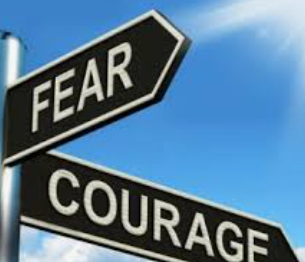
Be Courageous! Personal Management
What image comes to your mind when you think of courage?
A soldier in battle? A superhero fighting villains?
An underdog standing up to bully? A disabled person learning to walk again?
Today I want to talk about being more courageous, specifically:
- What the word courage means and its origins
- Why you desperately need it
- The process of developing courage
Courage takes so many different forms, but the common thread is someone taking action for what they believe is right, true, or ideal in the face of fear.
Webster’s definition of courage goes like this: mental or moral strength to venture, persevere, and withstand danger, fear, or difficulty.
The root of the word courage is cor – the Latin word for heart. Courage originally meant “To speak one’s mind by telling all one’s heart.” (-etymology dictionary) Courage definitely comes from our heart, and overrules our mind’s fear, excuses, or justifications to act otherwise.
Why is courage an important virtue to cultivate? You may never face physical danger or a serious health problem, but unfortunately life is full of opportunities to face fear. The question is, how will you deal with it? If you do not develop courage to plough through your fears your life is sure to be marked with regrets of opportunities lost, a long list of “what if’s”, and a feeling that you may have settled for second best. Often the greatest opportunities are on the other side of the door!
How can courage be developed? First, having a strong set of values is needed for courage. Beliefs that you hold dearly to no matter what happens, will feed the courage in your heart.
What are your values that you would defend to the end? What values are at stake in this situation you fear? Once you see the situation as a choice between living out your values or turning your back on them, you will find the conviction needed to press forward.
Courage can be shown by taking baby steps. Outside of life-or-death emergencies, usually you do not have to take the plunge all at once. I think sometimes people forget this and do not try at all. For example, if you must give a presentation to a group of peers and are feeling fear, practice in front of a friend or two.
Another step in the process of practicing courage is to identify what you are afraid of and playing out a “worst case scenario” in your mind. Sometimes what you initially THINK you are afraid of is not the underlying fear. Ask yourself what is the worst that can happen? Often the worst-case scenario is something that will not matter to us in a month or year. Calculate the risk of failure. Are you fearing rejection? Looking foolish? Punishment? Losing a lot of money? Injury? Death? What is the risk if you do nothing? Once we can put a label on the fear it tends to shrink and feel manageable.
There is a need for wisdom when calculating a risk. This is where research and wise counsel come in to play. And prayer! Courage does not always mean rushing in with immediate action.
What courage always DOES mean, however, is that you are true to values, do what is right, and what is for the overall good, even when you feel the fear, my friend.
-Jan Jones
God’s Word has a lot to say about fear. He has promised always to be with us when we are afraid. Here is a comforting verse:
“Have I not commanded you? Be strong and courageous. Do not be afraid; do not be discouraged, for the Lord your God will be with you wherever you go.”
JOSHUA 1:9
Check out this inspiring video on learning to dance with fear: